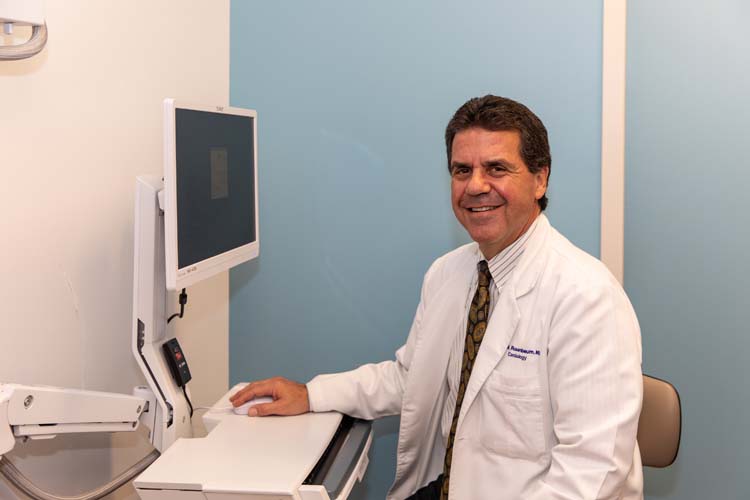
Heart disease is still the No. 1 killer in the U.S.
The National Center for Health Statistics reports that some 633,482 lives were lost to heart disease last year and the Centers for Disease Control now says one in every four deaths in this country will be tied to heart disease.
Dr. Alan Rosenbaum of the Indian River Medical Center is a five-star-rated cardiologist on Healthgrades.com who is very familiar with the symptoms and complexities of heart disease – along with preventive actions and treatment regimens that can save tens of thousands of lives a year.
Let’s start with heart attacks. According to the American Heart Association, “your heart muscle needs oxygen to survive. A heart attack occurs when the blood flow that brings oxygen to the heart muscle is severely reduced or cut off completely.”
That severe reduction or complete cutoff occurs when the coronary arteries become too narrow due to a buildup of fat, cholesterol and plaque: a process is known as atherosclerosis.
When plaque in a coronary artery breaks away, a blood clot can form and shut off the blood flow to the heart muscle, leading to a heart attack or, in doctors’ parlance, a myocardial infarction. It’s incredibly commonplace.
In fact, the AHA says, “every 40 seconds, someone in the United States has a myocardial infarction.”
It’s here where Rosenbaum makes a vitally important observation: Men and women often have strikingly different heart attack symptoms.
For men, he says, “there’s a typical 30 to 40 minutes of chest pain radiating down the left arm [with] some pain in the jaw and shortness of breath, nausea, diaphoresis – or sweating – that occurs with exertion and goes away with rest.
“Women,” Rosenbaum continues, “are much more variable in how their symptoms present. For example, in my training I saw a woman who came in with right elbow pain. I had another lady who had a left anterior descending artery blockage, but her pain was like a necklace: right around her neck and that was it. That’s the only pain that she had with exertion.”
Assuming patients get prompt medical attention and survive their first heart attack, the preventive actions and treatment regimens to avoid a second heart attack, says Rosenbaum, start with aspirin. “I would recommend 81 milligrams [because] there’s really no evidence that 325 mg does any better than 81 mg.
Rosenbaum says beta blockers should be considered too, because they “have been shown in trials to decrease a second heart attack from occurring.”
Beta blockers – drugs like Acebutolol (Sectral) and Metoprolol (Lopressor) – cause the heart to beat “more slowly and with less force, thereby reducing blood pressure. Beta blockers also help blood vessels open up to improve blood flow,” according to the Mayo Clinic.
“If the patient is hypertensive [has high blood pressure], ACE inhibitors or ARBs are also recommended,” Rosenbaum adds.
But cardiac care doesn’t stop there and patients have to take responsibility for their own care, even as they rely on their doctors for guidance and treatment.
The plain truth is neither doctors or their electronic medical records are infallible. Patients need to keep better track of all the medications, vitamins and supplements they take and share that information with every physician they see. Every time they see them.
“My strong recommendation to my patients is they make a list of their medications [whether they’re for heart disease or something else, entirely]. Every a time a medication change is made or added, change it on your list or make a new list. It’s laborious I know, but it keeps the record straight. And it’s a good habit to present this list to each doctor your see and say, ‘Am I on all these medications according to your records?’”
Is that really a big deal? You bet your life it is.
Say you have heart disease, but another doctor prescribes an antibiotic for something totally unrelated to your heart. Odds are you won’t see a conflict there, but for cardiologists like Rosenbaum that could be a huge red flag.
“The erythromycin family of antibiotics,” explains Rosenbaum, “can be challenging from an electrical perspective.” Certain patients can develop arrhythmias (irregular heartbeats) or even complete cardiovascular collapse from antibiotics when they’re combined with heart medications like beta blockers.
Of course, the best medicine is preventive medicine. Things like getting adequate exercise, eating a healthy diet, reducing stress and getting regular checkups.
If you’ve been diagnosed with heart disease or have a family history of it, talk to your primary care physician. He or she may refer you to a highly qualified cardiologist like Rosenbaum who will fully explain the best way or ways for you to avoid being one of those 633,482 people who lose their lives to heart disease each year.
Dr. Alan Rosenbaum is with the Indian River Medical Center. His office is in the hospital’s Health and Wellness building at 3450 11th Court, Suite 102. The phone number is 772-778-8687.



